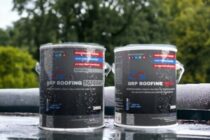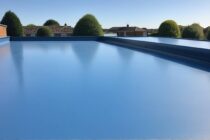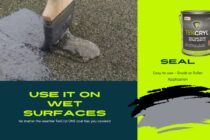Best product for roof repairs in winter
here is a list of some products that can be used for roof repairs in the winter:
CRYLICROOF: This liquid membrane is unaffected by temperature fluctuations and can be applied cold to all types of roofs, including flat and pitched roofs, bituminous surfaces, gutters, brickwork, asbestos, concrete, felt, metal, and fiberglass surfaces. It is not suitable for walkways or balconies and is not suitable for use on PVC or timber surfaces or for internal use.
Acrylic Roof Repair Patch: This patch is made of a flexible, waterproof acrylic resin that can be used to repair small holes, cracks, and tears in asphalt roofs. It is easy to apply and can be painted to match the existing roof color.
Polymer Roof Repair Cement: This two-part cement is designed for repairing larger areas of damage on asphalt roofs. It is strong and durable and can be painted to match the existing roof color.
EPDM Roof Repair Patch: This patch is made of a flexible, waterproof EPDM membrane that can be used to repair small holes, cracks, and tears in EPDM roofs. It is easy to apply and can be sealed to the existing roof with a heat gun.
TPO Roof Repair Patch: This patch is made of a flexible, waterproof TPO membrane that can be used to repair small holes, cracks, and tears in TPO roofs. It is easy to apply and can be sealed to the existing roof with a heat gun.
Metal Roof Repair Patch: This patch is made of a flexible, waterproof silicone sealant that can be used to repair small holes, cracks, and tears in metal roofs. It is easy to apply and can be painted to match the existing roof color.
Glass Roof Repair Kit: This kit contains everything you need to repair small holes, cracks, and tears in glass roofs. It includes a glass patch, sealant, and instructions.
Best product for roof repairs in winter: Winter Roof Repair Tips
The unpredictable weather conditions of winter can put a strain on your roof, increasing the likelihood of leaks and other problems. At Composite Roof Supplies, we understand the need for effective roof repair solutions throughout the year, even in the harshest conditions. Here are some helpful tips for tackling roof repairs during the winter months:
1. Store Products at Room Temperature:
Maintaining the proper temperature of roofing products is crucial for their effective curing process. Ideally, store roofing materials at room temperature to ensure they are at their optimal curing point when applied.
2. Time Your Repairs for Warmer Times of Day:
Best product for roof repairs in winter; Choose the warmest part of the day, typically around midday, for applying roof repairs. This timing allows the product to cure more effectively in the warmer temperatures, reducing the risk of curing issues due to cold weather.
3. Consider Post-Curing in Extreme Conditions:
For emergency repairs or extreme weather situations, post-curing may be necessary to accelerate the curing process. However, avoid using a naked flame, as this poses a fire hazard. Instead, consider using hot air post-curing techniques.
4. Utilize CRYLICROOF for Winter Repairs:
CRYLICROOF stands out as an exceptional choice for winter roof repairs due to its resilience to temperature fluctuations. This liquid membrane can be applied cold to various roof surfaces, including flat and pitched roofs, bituminous surfaces, gutters, brickwork, asbestos, concrete, felt, metal, and fiberglass.
5. Choose Suitable Products for Specific Applications:
While CRYLICROOF is a versatile product, it’s essential to select the appropriate materials for specific applications. Avoid using CRYLICROOF on walkways, balconies, PVC or timber surfaces, or for internal use.
By following these winter roof repair tips and utilizing CRYLICROOF, you can effectively address roof issues and maintain the integrity of your roof throughout the year, even during challenging winter weather.
Best product for roof repairs in winter
CRYLICROOF Unaffected by temperature CrylicRoof is ready for use and is cold applied to all types of roofs, including flat and pitched as well as bituminous surfaces, gutters, brickwork, asbestos, concrete, felt, metal and fiberglass surfaces. CrylicRoof is not suitable for walkways or balconies and is not suitable for use on PVC or timber surfaces or for internal use.




